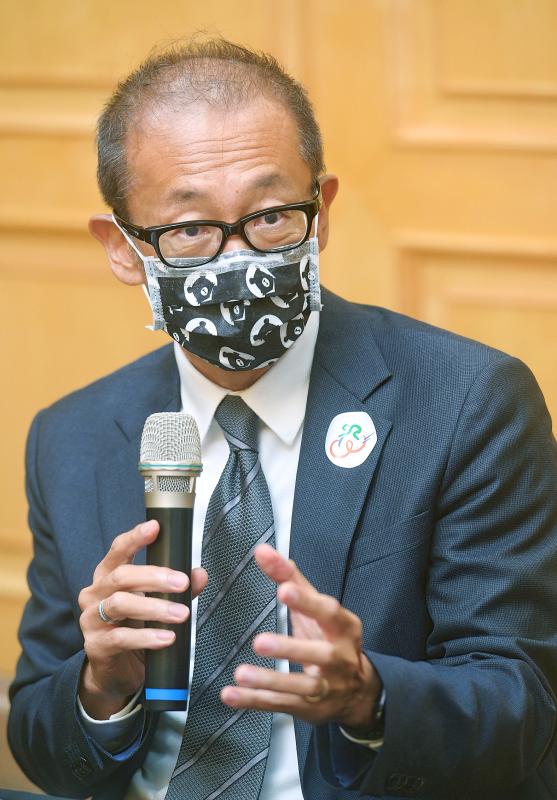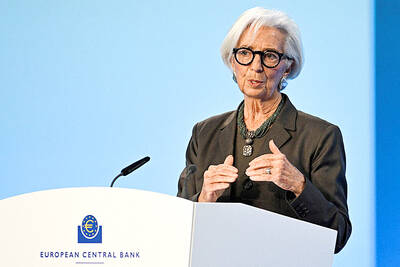Taipei Times: How has Formosa International Hotels Group (FIH) fared this year with a local COVID-19 outbreak and its lingering containment measures?
Steve Pan (潘思亮): Our revenue increased 40 percent in August from July, but our room revenues still tumbled 50 percent from last year, and down by 75 percent from 2019, before the COVID-19 pandemic. The government continues to ban the arrivals of foreign tourists. Other international tourist hotels fared worse with business plunging 85 percent. That is how bad things are.
Our domestic resort under the Silks Places (晶英酒店), Just Sleep (捷絲旅) and Wellspring by Silks (晶泉丰旅) brands are pretty much back to normal since August. The earlier level 3 alert drove those businesses to a stop, but they quickly recovered.

Photo: Chang Chia-ming, Taipei Times
The international tourist hotels have been a completely different story. Their business is still down 80 percent. Our flagship property, Regent Taipei, has been a victim of border controls due to its heavy dependence on international tourists.
TT: How did the group manage when the government in May raised the virus alert to level 3 and banned all dine-in services?
Pan: The move took away our major income sources, so we decided to provide food takeout and delivery. We created the “Take Regent Home” Web site. Today, it is the top food takeout brand in terms of revenue among all hotels. Our revenue is double that of the second runner-up. The Web site is doing very well, even though it only generates 50 percent of the revenue we had before the level 3 alert. It is likely a record of some sort to maintain 50 percent of dinning revenue amid a soft lockdown. FIH is the only international tourist hotel group that did not lay off employees or cut staff hours, in keeping with our “no layoff” policy. Our peers have reduced working hours to save costs.
Instead of layoffs, we launched an online training program covering digital skills and language training so employees could enhance their Japanese or English. We are keeping everybody pretty busy.
TT: How did the government help through this difficult time?
Pan: During the level 3 alert, the government provided wage subsidies for all sectors that saw their revenue decline 50 percent from 2019. The Ministry of Labor funded online training programs.
We took advantage of the slowdown to step up our COVID-19 prevention measures. We installed ultraviolet lights in our air conditioning systems in restaurants, bathrooms and elevators. The system can help kill viruses. We also upgraded our temperature devices, which can now take temperatures of 20 people at a time. Additionally, we introduced a food tracing system by listing the chef’s name on each takeout box, along with the time the food is made, so that we can respond to quality issues if they arise.
TT: Will the hospitality industry receive a strong and timely boost from the government consumption vouchers to be released next month?
Pan: Of course. We welcome these vouchers. It is better than nothing. However, it will not end the stress that international tourist hotels are experiencing. These hotels are in need of rescue and relief, not stimulus. The benefits of the vouchers will likely be distributed in an imbalanced fashion.
Domestic resort hotels are generally healthy since Taiwanese people cannot travel abroad. Few domestic tourists would visit the areas with international tourist hotels. So the vouchers will help hotels that are already in good shape.
The international hotels are like critically ill patients that are overlooked by policymakers.
We support the border controls to keep Taiwan safe, so that the economy can function. I just hope the government will provide remedy for the international hotels in return. In Singapore, the government provides different degrees of wage subsidies for international tourist hotels while border controls are in place. They subsidize 75 percent of wages during a level 3 alert, 50 percent during level 2 and 25 percent during level 1.
Taiwan should adopt a similar scheme to support affected industries. Policymakers are aware of the situation, but they have other more pressing matters to attend to.
TT: When do you think the hospitality industry will recover from the pandemic, or can it really emerge from it?
Pan: Travel will recover and grow in the long run, but it will never be the same after the pandemic. COVID-19 will have a serious impact on businesses linked to meetings, conferences, exhibitions and incentive travel. We expect business travel disruptions to persist. Many professionals have grown used to exchanging information on the Internet, where more people can participate more efficiently. In-person business travel will decline absolutely.
Future travel will become a hybrid of work and pleasure. There will be fewer but longer trips, as well as more trips closer to home.
I am still hopeful that things would return to normal next summer when most of developed nations achieve 80 to 90 percent vaccination rates. Hopefully Taiwan can join these ranks and lift border controls. The virus might become more flu-like and not life-threatening.
TT: Are there any changes to your group’s development plans?
Pan: We will continue to expand. The “Take Regent Home” Web site is to remain a major revenue driver. We aim to invite our luxury goods partners to join the platform. We also plan to develop the system into a “cloud kitchen” in the long term so more people in Taiwan can enjoy Regent’s best cuisines.
In the meantime, we are expanding our footprint. We opened a new Just Sleep property in Tainan last month. It already broke even in its first month with 50 percent occupancy rates and 60 percent this month.
We plan to bring Regent Residences to Taiwan. These are luxury housing units featuring Regent-quality services in overseas markets. We are in talks with leading developers.
There will be a new Wellspring by Silks in Yilan’s Toucheng Township (頭城鎮) in 2023 and in Taipei’s Beitou District (北投區) in 2024, depending on the progress of renovations. The Regent brand is to see more properties in China and other parts of Asia. Regent Hong Kong is scheduled to reopen next year.

European Central Bank (ECB) President Christine Lagarde is expected to step down from her role before her eight-year term ends in October next year, the Financial Times reported. Lagarde wants to leave before the French presidential election in April next year, which would allow French President Emmanuel Macron and German Chancellor Friedrich Merz to find her replacement together, the report said, citing an unidentified person familiar with her thoughts on the matter. It is not clear yet when she might exit, the report said. “President Lagarde is totally focused on her mission and has not taken any decision regarding the end of

French President Emmanuel Macron told a global artificial intelligence (AI) summit in India yesterday he was determined to ensure safe oversight of the fast-evolving technology. The EU has led the way for global regulation with its Artificial Intelligence Act, which was adopted in 2024 and is coming into force in phases. “We are determined to continue to shape the rules of the game... with our allies such as India,” Macron said in New Delhi. “Europe is not blindly focused on regulation — Europe is a space for innovation and investment, but it is a safe space.” The AI Impact Summit is the fourth

CONFUSION: Taiwan, Japan and other big exporters are cautiously monitoring the situation, while analysts said more Trump responses ate likely after his loss in court US trading partners in Asia started weighing fresh uncertainties yesterday after President Donald Trump vowed to impose a new tariff on imports, hours after the Supreme Court struck down many of the sweeping levies he used to launch a global trade war. The court’s ruling invalidated a number of tariffs that the Trump administration had imposed on Asian export powerhouses from China and South Korea to Japan and Taiwan, the world’s largest chip maker and a key player in tech supply chains. Within hours, Trump said he would impose a new 10 percent duty on US imports from all countries starting on

STRATEGIC ALLIANCE: The initiative is aimed at protecting semiconductor supply chain resilience to reduce dependence on China-dominated manufacturing hubs India yesterday joined a US-led initiative to strengthen technology cooperation among strategic allies in a move that underscores the nations’ warming ties after a brief strain over New Delhi’s unabated purchase of discounted Russian oil. The decision aligns India closely with Washington’s efforts to build secure supply chains for semiconductors, advanced manufacturing and critical technologies at a time when geopolitical competition with China is intensifying. It also signals a reset in relations following friction over energy trade and tariffs. Nations that have joined the Pax Silica framework include Japan, South Korea, the UK and Israel. “Pax Silica will be a group of nations